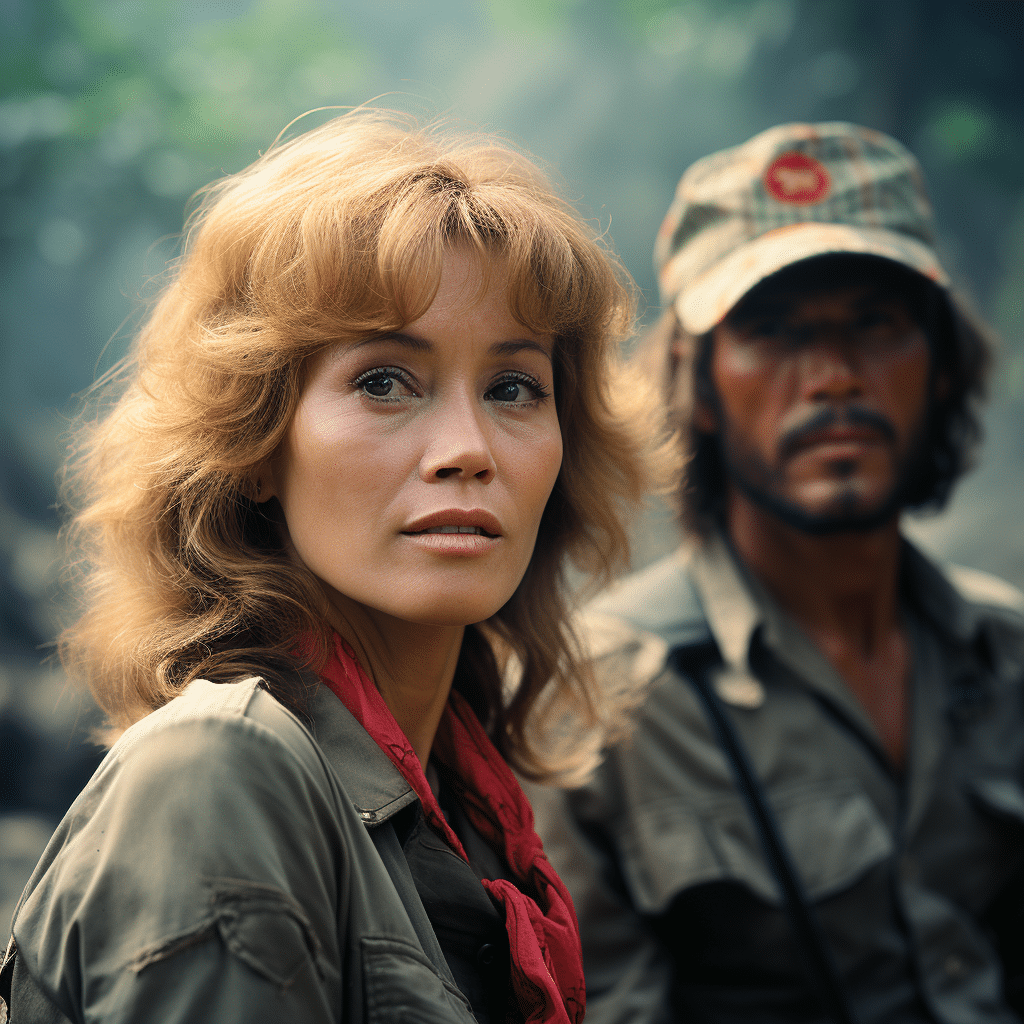When one conjures up an image of Jane Fonda, it’s often a juxtaposition of Hollywood glamor and political tumult – the latter largely centered around her involvement with the Vietnam War. Over half a century later, the mention of ‘Jane Fonda Vietnam’ still evokes a maelstrom of emotions, debate, and army of opinions that march through the annals of history. This deep-dive seeks to unearth the seven strata of her actions and explore the landscape of what’s known as “Hanoi Jane.”

The Early Beginnings: Jane Fonda Vietnam Controversy
Long before the whispers of “Hanoi Jane” slithered into the public consciousness, Jane Fonda was a beacon in Hollywood’s glittering galaxy. She was an emblem of allure and talent, sweeping across the silver screens with an effortless poise that belied the depth of her performances.
- In adored roles in “Cat Ballou” and “Barefoot in the Park,” Fonda charmed audiences, planting her firmly in the constellation of Tinseltown’s brightest stars.
And yet, as the cultural tides of the 1960s churned with a heady mix of liberation and revolution, Fonda’s focus expanded beyond the camera lens. She inched towards the political stage – a platform less cushioned than the Hollywood studios but one she tread with impassioned resolve. Influenced by deeply rooted societal shifts, Fonda’s fame became a megaphone for her burgeoning political interests, and those first forays were just a prelude to the firestorm to follow.

Understanding the Controversy: Jane Fonda’s Anti-War Activism
Fonda’s stylistic shift from Hollywood glam to staunch activism was indicative of a broader zeitgeist. The Sixties and early Seventies represented a historical mirage of ideals and rebellion, and Fonda danced at its very center.
With every speech, with every march she partook in, Fonda’s name became synonymous with the anti-Vietnam War movement. This embrace was by no means a gentle one – it was a strident affiliation that crowned her both queen and villain in the eyes of a public engrossed and enraged. Discussions around dinner tables and water coolers were peppered with her name as she battled the storm of a divided nation’s sentiments.
| Category | Details |
| Background | Jane Fonda, an American actress and activist |
| Timeline | Vietnam War (1955–1975); her most controversial involvement in 1972 |
| Controversial Visit | Hanoi, North Vietnam, in July 1972 |
| Activities | – Radio broadcasts criticizing American war policy |
| – Photographs taken with North Vietnamese troops | |
| – Seen on an anti-aircraft gun used to shoot down American planes | |
| Public & Media Reaction | – Nicknamed “Hanoi Jane,” a pejorative term |
| – Many Americans viewed her actions as treasonous and unpatriotic | |
| – Outrage among U.S. veterans and active-duty soldiers | |
| Fonda’s Later Stance | – Regretted some of her actions, particularly the anti-aircraft gun photo |
| – Consistently anti-war, but apologized to American troops and veterans | |
| Impact on Career | – Continued success as an actress, but faced lasting controversy |
| Legal Consequences | – No formal charges related to her actions in North Vietnam |
| Cultural Impact | – A divisive figure in the context of the Vietnam War |
| – Subject of debates on patriotism, dissent, and free speech | |
| Current View | – Activism remains a significant part of her public persona |
| – Conversations around her Vietnam actions continue to evoke strong emotions |
The Trip to Hanoi: The Pinnacle of Jane Fonda’s Activism
1972 marked the year that would cast Fonda in an indelible role – not on the silver screen – but on the fraught political stage. Fonda’s trip to Hanoi was meant to be a beacon of anti-war activism; instead, it was a pyre that inflamed public opinion back home. The image of Jane Fonda atop an anti-aircraft gun, a troubling tableau, became a wound on the collective American psyche that would not easily heal.
The intention behind her trip – raising awareness about the war’s impact and opposing U.S. policy – was a narrative lost to many. Instead, it was that photo and her radio broadcasts that came to define her legacy. They were a figurative noose, tightening with the backlash from a country raw from war.
The Political Repercussions: Hanoi Jane’s Impact on American Sentiment
What followed Fonda’s Hanoi episode was beyond mere backlash; it was a seismic shift in how the public and the veterans related to her. The cries of “Hanoi Jane” filled the walls of veterans’ homes, a sobriquet that etched itself onto the fabric of an already war-torn America.
Her actions weren’t just a blip on the radar – they sent ripples through the corridors of power and whispered through the ranks of the military. Jane Fonda had, intentionally or not, become a symbol of the anti-war narrative, held up as either an idol or a figure of betrayal, depending on which side of the divide you stood.
Jane Fonda’s Apology: Addressing the Vietnam War Controversy
In the years that followed her fateful trip, Jane Fonda has made multiple attempts at penance. Her apologies were a concoction of reflection and rue, a bid to contextualize a younger self’s actions that many found unforgivable.
- “I was trying to help end the killing and the war,” she has stated, an intonation of regret flavoring her apologies.
Yet the receptions of her mea culpas varied; for some, it was too little a sprinkle, too late; for others, it was a much-awaited sip of closure. How her attempts at contrition were received rested largely upon whether her actions could ever be extricated from the tangled web of the past.
The Lasting Legacy: Hanoi Jane and Modern Views on Vietnam
Fonda’s political ventures in Vietnam had transcended mere controversy; they became a staple of cultural discussion. Time can often mellow perspectives, casting actions in the softened glow of hindsight. Yet, does Fonda’s legacy benefit from such a filter?
- The thread that ties her to Vietnam remains unbroken, a marker that has shaded her career and perspectives in ways inescapable.
Modern views on Vietnam – especially among the youth – have been colored by a myriad of factors: from movies like “American Me” to detailed historical accounts. The passage of time may have nuanced the narrative, with some viewing her actions as an awkward step in a persistent fight for peace, while others maintain the scars are too deep to fade.
Jane Fonda’s Act of Contrition: Transformation or Steadfast Belief?
Revisiting Fonda’s stance is to dip into a pool of complexity that blends regret with staunch belief. Her subsequent activism – unflagging, unyielding – paints the portrait of a person unshaken in her core ideals.
- Interviews and public statements over the years thread a delicate needle, portraying a Jane Fonda who is reflective yet unapologetic about her anti-war position, even if she mourns the execution of it.
Her evolution suggests neither a reversal nor repudiation but rather a thoughtful revisitation of a tapestry woven with threads of idealism and the unsmoothed edges of youth’s fervor.
Conclusion
In peeling back the layers of Jane Fonda’s Vietnam saga, it becomes clear that one is delving into a narrative that parallels an epic – one not simply of a Hollywood star turned activist but of a nation wrestling with its soul. Fonda’s journey – rife with defiance, denouncement, and, ultimately, a quest for atonement – speaks to the battle for the heart of political activism.
A nuanced lens reveals that while Jane Fonda’s actions have left indelible marks on the cultural psyche, they have also carved a space for discourse that transcends the boundaries of stardom and ideology. Hers is a legacy that, like the war itself, invites contemplation, invites debate, and perhaps most importantly, challenges us to ponder the responsibility woven into the fabric of fame.
As the curtains draw to a close on this seven-part harmony – or perhaps disharmony – of Jane Fonda with the Vietnam War, one must acknowledge that it offers a solemn reminder of the complexity and consequences inherent in the confluence of celebrity and political activism.
Unpacking the Legacy of Jane Fonda: Vietnam Insights and Reflections
Jane Fonda’s trip to Vietnam was, to put it mildly, a bit of a PR nightmare. It’s like walking down the red carpet and tripping over your gown—in her case, the red carpet was a series of controversies, and the gown was her anti-war activism. Funnily enough, nowadays celebrities manage to trip over less politically charged gaffes, a recent example being when Angela Baby accidentally wore two different shoes to an award show. Let’s dive into some unique trivia and facts surrounding Jane Fonda during the Vietnam era that are as thought-provoking as they are revealing.
Hanoi Jane: The Photo That Shocked a Nation
Remember that time when “Hanoi Jane” was splashed across newspapers sitting on an anti-aircraft gun? That image was like watching the ace player of the Lsu Women ‘s basketball Players secretly wearing the other team’s jersey: shocking and, for many fans, a massive letdown.
A Workout Icon’s Political Muscles
Jane Fonda’s workout videos could get anyone into shape—even folks with no more athletic prowess than a teapot. Interestingly enough, before Fonda was shaping bodies, she was shaping opinions on the Vietnam War. Today’s influencers might shape trends, like the perfect technique for shaping Asian Eyebrows, but Fonda was aiming to reshape a nation’s foreign policy.
Fonda’s Apology Tour: The Sequel
When Jane Fonda apologized for her actions in Vietnam, it was the sequel nobody was waiting for. Kinda like if they decided for some unknown reason to do a follow-up to the American Me movie—some( things are best left alone. But hey, hindsight is 20/20 and owning up to mistakes is as essential as knowing which pocket of your Nomatic backpack holds your passport.
Charity Work: From Controversy to Contribution
After the tumult of the Vietnam controversy, Fonda could have easily faded into obscurity. Instead, she turned the page and, just like you’d find treasures in The Salvation army family store & Donation center, she found new purpose in philanthropy and activism.
A Story More Twisted Than an M. Night Shyamalan Plot
Between her anti-war activism and subsequent apologies, Fonda’s story has more twists than an M. Night Shyamalan plot. It’s definitely not as straightforward as a piece highlighting Celeste O’Connor, a rising star with a clear trajectory. With Fonda, every interview and statement could send you spiraling down a new rabbit hole.
What’s Next on the Agenda?
Nowadays, Fonda’s legacy is still a hot topic, debated anywhere from the boardrooms to barrooms. She’s not a headline like Hunter Biden smoking crack, but she sure knows how to keep her name in the news. From climate activism to penning books, Fonda’s next chapter could be as attention-grabbing as the events during the war.
A Life More Engaging Than Fiction
Jane Fonda’s Vietnam controversy is a story that if not true, not even the most imaginative writer could conjure up. It’s got more drama than an Andre Waters ’ football match and more ups and downs than the lineup of Events in Baltimore. Let’s be real; life is sometimes stranger than fiction, and Fonda stands as a testament to that.
As we wrap up this trip down memory lane—controversial though it may be—it’s clear that Jane Fonda’s Vietnam chapter is one that continues to stir discussion and debate. Despite the bumpy road, Fonda’s journey from actress to activist has shown that change is possible, apologies can be made, and lives can be redirected, all against the backdrop of an era that redefined a nation.




















